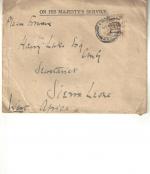[Luke, Typed Letter signed (TLS) from Sir Ronald Storrs to Sir Harry Luke. The l
Typed Letter signed (TLS) from Sir Ronald Storrs to Sir Harry Luke. The letter was written during Storrs’ time as Governor in Jerusalem and is on British Colonial Office stationery: ‘My dear Harry – Thank you for yours of exactly one month ago. But no protestations will avail to wipe out from my family the imperishable memory of your behaviour at the wedding feast. I forward you King Pausolus and for earnest favour of return the intermittant Satyr from which I derived great benefit. Pirie-Gordon stayed with us three or four days of the pilgrimage and told me (greatly to my pleasure) that you had before leaving London something like definite personal encouragement for Ubr. Alas I fear Billy G’s visit will be too late to help; but if the worst has not happened by then your subcutaneous and intra-muscular propulsion will be infinitely esteemed by yours, with homage to the Princess Patricia, threys R S”.
[This item is part of the Sir Harry Luke – Archive / Collection]. Jerusalem, The Governorate, March 17th, 1926. Octavo. One page with original envelope. From the private collection / library of colonial governor, diplomat and historian, Sir Harry Luke.
Sir Harry Charles Luke KCMG GCStJ (born Harry Charles Lukach) (4 December 1884 – 11 May 1969) was an official in the British Colonial Office. He served in Barbados, Cyprus, Transcaucasia, Sierra Leone, Palestine, Malta, the British Western Pacific Territories and Fiji. He is the author of some books on several of these countries. (Wikipedia)
Sir Ronald Henry Amherst Storrs KCMG CBE (19 November 1881 – 1 November 1955) was an official in the British Foreign and Colonial Office. He served as Oriental Secretary in Cairo, Military Governor of Jerusalem, Governor of Cyprus, and Governor of Northern Rhodesia. In 1917 Storrs became, as he said, “the first military governor of Jerusalem since Pontius Pilate”, for which purpose he was given the army rank of colonel. He was in fact the second British military governor of Jerusalem, succeeding Brigadier General Neville Travers Borton, also known as Borton Pasha, who resigned after two weeks due to ill health. In 1921 he became Civil Governor of Jerusalem and Judea. In both positions he attempted to support Zionism while protecting the rights of the Arab inhabitants of Palestine, and thus earned the hostility of both sides. He devoted much of his time to cultural matters, including town planning, and to Pro-Jerusalem, a cultural organisation that he founded.
In 1919, Storrs was appointed a Commander of the Order of the Crown of Italy.
The country’s (Palestine/Israel) first chess club was the International Chess Club founded in Jerusalem in 1918 by Sir Ronald Storrs. International Chess Club was an expression of the hope that it would be a chess club that would unite the different nations – local Arabs and Jews, and European Christians of various nations who were then stationed in the city – and help promote peace and understanding. Unfortunately the club closed within a year of its founding, due to the increasing tensions between the Arabs and Jews. A genuine chess enthusiast, Storrs also helped to organise in 1919 the city’s first championship which was won by Shaul Gordon, the founder and director of Mercantile Bank and a pivotal figure in the city’s public and cultural life. (Wikipedia)
Harry Pirie-Gordon – Lieutenant Commander Charles Harry Clinton Pirie-Gordon (1883-1969), of Buthlaw in Aberdeenshire … journalist, naval intelligence officer, genealogist … He worked for The Times in London from 1912 to 1914 and again from 1919 to 1939 after service during the First World War — he edited the military newspaper, Palestine News. He was editor of “Burke’s Landed Gentry” from 1930 to 1936. The Gordon family had acquired Buthlaw, Aberdeenshire, in 1664.
Pirie-Gordon was responsible for the preparation of a series of Guide-Books published by the Palestine News immediately after the First World War. The information had been prepared for the British attack on Palestine. Pirie-Gordon first went to Syria in 1908 ostensibly to study Crusader Castles. He took part in the survey of the Syrian coast around Alexandretta and worked as a foreign correspondent for The Times. Pirie-Gordon was commissioned in the Royal Navy Volunteer Reserve (RNVR) and initially worked through the Arab Bureau in Cairo. After a spell in Salonica, he was commissioned in the Army, returned to Cairo and took responsibility for the publication of the Palestine News for the Egyptian Expeditionary Force. Allenby’s campaign in Palestine drew on the developing technology of aerial photography to prepare accurate maps of troop dispositions.
In April 1916, Harry Pirie-Gordon was appointed civil administrator of Makronisi (Long Island), an island which is now called Cheustan and which is in the bay in front of the Turkish city of Izmir/Smyrna. (Source: cosmos ucc)
- Keywords: British Colonial Administration · British Colonial History · British Foreign Office · British Foreign Policy · Governorate Jerusalem · Harry Luke – Sierra Leone II (1924 – 1928) · Harry Pirie-Gordon · Palestine · Palestine – Content / Sir Harry Luke Collection · Palestine Content (Autographed Letter Signed – ALS) · Sierra Leone · Sierra Leone / Sir Harry Luke Collection · Sierra Leone Content (Autographed Letter Signed – ALS) · Sierra Leone Content / Second Posting 1924-1928 – Sir Harry Luke · Sir Harry Luke · Sir Harry Luke – Personal Archive of Books and Correspondence · Sir Harry Luke Collection · Sir Ronald Henry Amherst Storrs
- Language: English
- Inventory Number: 30245AB
EUR 275.000,--
© 2024 Inanna Rare Books Ltd. | Powered by HESCOM-Software












